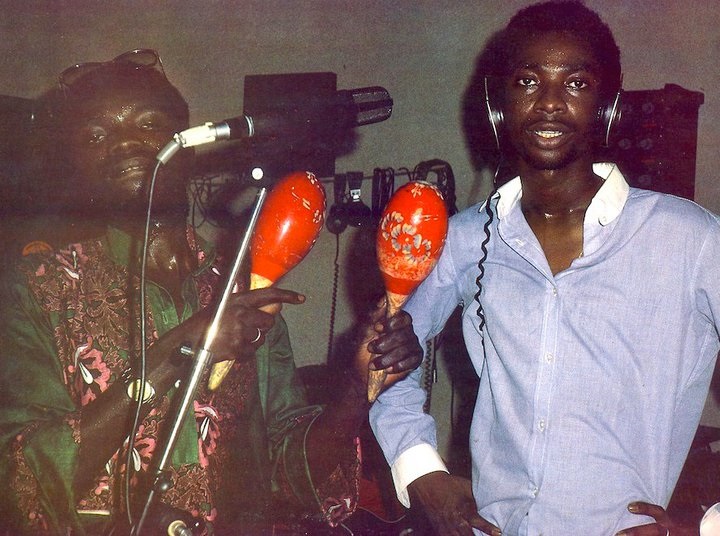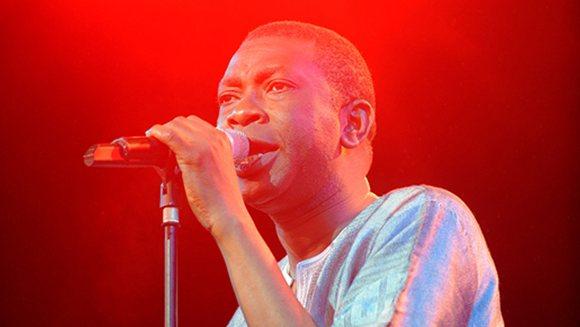You either get Youssou N’Dour, or you don’t. For millions on his home turf, the Senegalese singer is a major cultural figure: the street urchin-turned-superstar who almost became president. For large numbers of Western fellow travellers he’s the sexiest, most charismatic figure to emerge from the whole world music phenomenon. For everyone else, specifically the 99 percent of the Western public who aren’t into world music and didn’t buy 7 Seconds (and even some of those who did), he’s, well, a bit boring: an average-looking, dull interviewee, whose music floats by in a simultaneous blur of exoticism and odd blandness.
This well-meaning documentary from Jeremy Marre contained handsome reportage of contemporary Senegal, masses of choice archive footage and extensive, apparently frank interviews with the man himself. Yet it remained unlikely to impress the unconvinced. It took me a few seconds to clock that the round-faced bloke in glasses, suit and tie was in fact Youssou: he looked just like an ill-at-ease, middle-aged politician. But that is what the 54-year-old now is. At the time of making the film he was Senegal’s culture minister. How he got to that position should be a hell of a story, yet in this telling it manifestly failed to ignite.
The associates, from family members to Peter Gabriel, were for the most part staggeringly dull
N’Dour’s childhood in a working-class area of the Senegalese capital Dakar, his early career as a teenage nightclub singer and subsequent discovery by the Western record industry were all rolled out in fairly predictable fashion (Youssou in the early years, pictured below right), aided by leaden, but mercifully sparse narration. We were told that Dakar itself plays a central role in Youssou’s music, a fact confirmed by the man himself with one of far too few twinkles in his eye. Yet just pointing the camera at exotic street scenes didn’t convey the atmosphere and edge of the big bad African city.
While the film didn’t shy away from the “issues” – his vexed relationships with Western record labels, the question of his dominant position in the Senegalese media and the controversy surrounding his “Islamic” album Egypt – the treatment was relatively perfunctory. It all felt like foreign, colourful stuff taking place in a foreign, colourful dimension. Even the music, which is surely the point of the whole thing, tended to all sound a bit the same, whether it was latin-flavoured rhythms, gutsy local recordings, ponderous stadium ballads or execrable collaborations with Peter Gabriel; though it was certainly good to hear his extraordinary gilded shriek in its classic youthful form.
Rather than establishing a feel and a flavour that would bring alive the intrigues and power play of Senegalese politics and music, the tumultuous process of African urbanisation and N’Dour’s role within it, the film left it to the comments of N’Dour and his close associates to set the tone. While the associates, from family members to Peter Gabriel, were for the most part staggeringly dull, it was Youssou himself who was the real problem.
 It wasn’t that he came over badly. The most grudging viewer would have conceded he seemed a decent bloke. But the nature of music in Senegalese society forced him into a statesmanlike role long before he actually became a politician. A lifetime of probing attention has left him cautious. Here he admitted that he didn’t really have a childhood or an education because he was too busy singing, and spoke with some bitterness about the expectation of Western labels that he would sell like Phil Collins. By his standards these are spectacular revelations. Yet it all came over as rather flat and worthy.
It wasn’t that he came over badly. The most grudging viewer would have conceded he seemed a decent bloke. But the nature of music in Senegalese society forced him into a statesmanlike role long before he actually became a politician. A lifetime of probing attention has left him cautious. Here he admitted that he didn’t really have a childhood or an education because he was too busy singing, and spoke with some bitterness about the expectation of Western labels that he would sell like Phil Collins. By his standards these are spectacular revelations. Yet it all came over as rather flat and worthy.
There are whole other aspects to N’Dour’s personality, a mischievous, godfatherish trickster side, which this programme failed to reveal. At one point Neneh Cherry referred to Youssou’s God-given status in Senegal. “They all believe it,” she said, adding with a twinkle, “and so does he.” That moment alone gave a flavour of the real Youssou, and in a programme of nearly an hour it lasted somewhere less than seven seconds.















Add comment